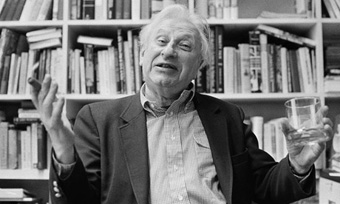The Human Voice at 100
Permanent link All Posts
I almost said no when my friend asked if I wanted to come, but in the end, how many opportunities do you have to celebrate a great man's 100th birthday? Last night at the Newberry Library, a packed house honored Studs Terkel on the centennial anniversary of his birth. We sang songs, listened to stories about the man himself, and ate cake shaped like his signature red checkered shirt. "This weekend in particular," said the host, "buy one of Studs' books and give it to a young person."
What's the big deal? you may ask yourself. Who is this guy and why should I read him?
For one, they're amazing books that changed my life, but I understand if that's too hyperbolic to make much of a judgment yet.
Louis Terkel (yes, Jewish) moved to Chicago from New York in 1920, when he was eight years old. He helped his mother run a boarding house near Merchandise Mart, where he first made close study of the characters who would fascinate him his whole life. The boarding house was near Bughouse Square, where rabble-rousers attracted crowds year-round with speeches and calls to action. Studs is an alum of my alma mater—he got a law degree from the University of Chicago in 1932, but "there was some trouble passing the bar," according to our host last night (everyone chuckled).
He came of age during the Depression, and began a life of astounding engagement with the world. Studs was an actor, an activist, a radio DJ, a journalist, an oral historian, a gabber, a talker, a listener, an encourager. He talked to everybody and anybody, fundamentally committed to the idea that all people have a story to tell. He died on Halloween in 2008, just a few days before the presidential election. He and his beloved wife were buried together beneath a tree in Bughouse Square—or Washington Square Park, as it's officially called, right outside the Newberry Library.
Studs came into my life in 2009. I'd heard his name before that, but wasn't really sure who he was or why he was important. At that time, I was living and breathing Band of Brothers, the spectacular HBO miniseries about the 101st Airborne paratroopers who fought in WWII from Normandy to Bastogne to Berchtesgaden. I was reading every autobiography of Easy Company men I could get my hands on, not to mention Stephen Ambrose's original Band of Brothers book. At a bookstore in D.C., a friend shoved "The Good War" into my hands. "I'm not letting you leave without buying this book," she said. "You of all people have to read it."
When I finally cracked the spine (all of Studs' oral histories are doorstops), I was engrossed. No book has moved or challenged me quite so much as that one. Studs talks to everybody, and makes no judgment on any of his interviewees. We hear from SS officers, children who were in Hiroshima, POWs from Bastogne and Bataan, black soldiers who were hideously abused by the Army, journalists who covered the war behind enemy lines, women who worked at factories, crooks who ran the black market, Japanese-Americans sent to internment camps, draft dodgers, conscientious objectors, USO performers, high government officials, Marines who fought through Okinawa, Axis soldiers, Axis civilians, Hitler youth, spies, MPs, ordinary people… Studs lets those who lived it tell it for themselves, and in doing so, never lets us think that WWII is so simple as being "the good war."
This book floored me. All of his do. Read Hard Times, his oral history of the Depression, and tell me the things people said about the 1930s don't sound shockingly contemporary. Lest you think he's one of those "boring, serious" historians, you should know that while Studs takes on issues like race, poverty, age, death and war, he also brings you into the lives of vaudeville musicians, movie stars, sportscasters, rail-riders, comedians and numberless wonderful, joyous, fascinating people. Studs is epic and intimate in scope at the same time, and revels in it, and believes in it with all his being. His work so articulates what I want to do with my own life that, in searching for a career, I found myself asking, "How can I be Studs Terkel when I grow up?"
Again, I understand this may be a bit effuse and hyperbolic. It's easy to get that way about those world-altering experiences. I'll follow last night's example, and let Studs make his own case.
One of the speakers told us about a hotline the public can call, to either share their encounters with or experiences of Studs, or to talk about an instance in which listening has been important to them. The number is (559) 546-1661, and you can hear from other people at the Studs Terkel Centennial Celebration website. There will be more events throughout the next year, but I hope you can attend at least one, on your own time: reading and experiencing one of his books.



.jpg)



